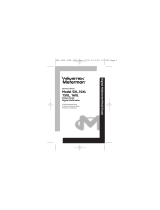
2
Introduction
The PM51 meter is a shirt-pocket size meter only 19 mm (.75 in) wide and
weighing less than 85 g (3 oz). With full functionality offering AC and DC
voltage to 600 V, resistance to 40 MΩ, capacitance to 300 µF, frequency to
1 MHz, continuity with beeper, and diode test. Fully autoranging, the PM51
offers seven different measurement functions with 27 full ranges of
measurement. The digital display is oversized with large digits and icons in
the display. In spite of its small size, the PM51 is full safety rated to CAT III
300 V, CAT II 600 V, and is UL listed. No other meter offers this size with
such performance and high safety ratings.
Safety Information
• The PM51 Digital Multimeter is certified for cULus and EN61010-
1:2001; CAT II 600 V, CAT III 300 V, class 2 and pollution deg. 2.
• This instrument is EN61010-1 certified for Installation Category II
(600 V). It may only be used to make measurements on energy limited
circuits within equipment and not directly connected to mains.
• This instrument is EN61010-1 certified for Installation Category III
(300 V). It is recommended for use with local level power distribution,
appliances, portable equipment, etc., where only smaller transient
overvoltages may occur, and not for primary supply lines, overhead
lines and cable systems.
• Do not exceed the maximum overload limits per function (see
specifications) nor the limits marked on the instrument itself. Never
apply more than 600 V between the test lead and earth ground.
• Inspect the DMM, test leads and accessories before every use. Do not
use any damaged part.
• Never ground yourself when taking measurements. Do not touch
exposed circuit elements or test probe tips.
• Do not operate the instrument in an explosive atmosphere.
• Exercise extreme caution when: measuring voltage >20 V // current >10
mA // AC power line with inductive loads // AC power line during
electrical storms // current, when the fuse blows in a circuit with open
circuit voltage > 600 V // servicing CRT equipment.
• Remove test leads from circuit before opening the case.















